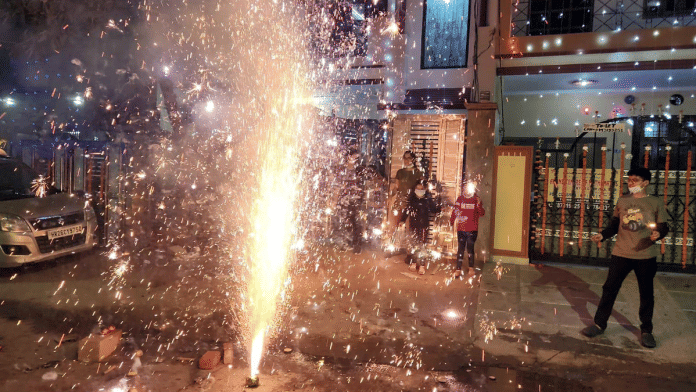New Delhi: The Supreme Court Friday rejected an application filed by firecracker manufacturers to allow the use of barium with approved formulations in green crackers, reiterating its earlier orders.
A bench of justices A.S. Bopanna and M.M. Sundresh also rejected a petition filed by firecracker manufacturers to use joined crackers, like series crackers or laris. It said that it was declining the applications “for the present”.
The court is currently hearing a petition that was originally filed by three infants — Arjun Gopal, Aarav Bhandari and Zoya Rao Bhasin — back in 2015, through their legal guardians. Two of the petitioners in the case were six months old and one was 14 months old.
Significantly, Diwali will be celebrated from 10 to 14 November.
The original petition had highlighted the severe air pollution in Delhi, asserting that while poor air quality affects everyone, children are more vulnerable to air pollutants. They submitted that it could lead to aggravation of asthma, coughing, bronchitis and even cognitive impairment.
Friday’s development comes over a week after the court refused to interfere with the complete firecracker ban imposed in the National Capital Territory of Delhi, rejecting a plea by Bharatiya Janata Party (BJP) MP Manoj Tiwari,
Also Read: Most in India’s Hindi belt support fireworks sale ban. Don’t let TV tell you otherwise
Green crackers to time restrictions — what court has said so far
While hearing this case over the years, the apex court has spoken about the duty of the government and citizens to ensure a healthy environment — Articles 48A and 51A(g) of the Constitution.
In October 2018, the court issued a landmark order in the petition. It did not ban firecrackers altogether, but imposed several conditions on bursting them. For example, it said that only green crackers should be manufactured and sold.
It said that on Diwali or other festivals like Gurpurab, when firecrackers are generally used, it should strictly be done between 8 pm and 10 pm throughout India. On Christmas and New Year’s Eve, it said the firecrackers can only be used from 11.55 pm till 12.30 am. But it later allowed southern states to burst firecrackers in the morning, subject to a two-hour window.
The October 2018 order also banned the use of chemicals including barium nitrate in the manufacture of crackers. By the same order, the court also banned the manufacture, sale and use of joined firecrackers (series crackers or laris), asserting that it causes “huge air, noise and solid waste problems”.
“Major Indian cities may explore the option of community fire-cracking with strict time restriction as adopted in some countries. Other restrictions that can be explored include — bursting of firecrackers may be allowed only in the areas/fields pre-identified and pre-designated by respective state governments,” the court had added.
The court has since been issuing several orders on similar lines, overseeing the plans submitted for formulation and deployment of green crackers.
In October 2021, the court noted that despite various directions by the court, the manufacture, sale and use of banned fireworks have continued. It also clarified that there wasn’t a complete ban on the use of firecrackers and only certain fireworks — for example those containing barium salts — are banned.
It also pulled up states and Union territories for not enforcing the ban strictly, warning them of action if any banned firecrackers are manufactured, sold and used. They had also been asked to give wide publicity to the ban through electronic media/print media/local cable services.
(Edited by Uttara Ramaswamy)
Also Read: Your Diwali firework set off a lethal revolution in military tech in China centuries ago






